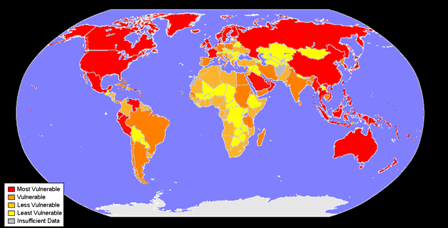Carbon Emissions are Killing the Oceans
The massive amount of carbon dioxide entering the oceans is dramatically altering seawater chemistry, which has been stable for millions of years and has allowed the oceans to flourish and evolve into the diverse, life-giving waters we know and rely upon today.
This flood of carbon dioxide in the oceans makes them more acidic, threatening corals, shellfish, and fish, and threatening to undermine entire marine ecosystems. Scientists predict a mass extinction of coral reefs will occur in this century unless we change the way we do business.
Ocean acidification is a threat to all nations, though some are more vulnerable than others. These effects will likely include a loss of tourism revenues and coastal protection from coral reefs, a loss of revenues from fisheries, and reduced availability of fish as a source of food.
Yet, many of the most vulnerable nations are also the largest producers of carbon dioxide – the cause of ocean acidification – and thus, have the greatest ability to stop it from worsening.
To stop ocean acidification, we need to reduce carbon dioxide emissions to attain a level of 350 ppm CO2 in the atmosphere. This will require a major shift to carbon-free energy such as solar and wind power.
 A recent Oceana analysis entitled “Major Emitters Hardest Hit by Ocean Acidification” ranked countries according to their vulnerability to ocean acidification. Here’s what we found:
A recent Oceana analysis entitled “Major Emitters Hardest Hit by Ocean Acidification” ranked countries according to their vulnerability to ocean acidification. Here’s what we found:
- Japan ranks first among the most vulnerable nations, followed by France, the United Kingdom, the Netherlands and Australia.
- China and the United States, the world’s top-ranked carbon dioxide emitters, ranked 13th and 8th, in relative vulnerability to ocean acidification.
- More than one-third of the world’s population lives in one of the top 25 nations that will be most affected by ocean acidification.
- Among the most vulnerable are those with the highest GDP, including the United States, China, Japan, Canada, the United Kingdom and the Republic of Korea. These six nations alone were responsible for 51 percent of global CO2 emissions in 2007.
See Oceana’s Copenhagen Advertising Campaign



